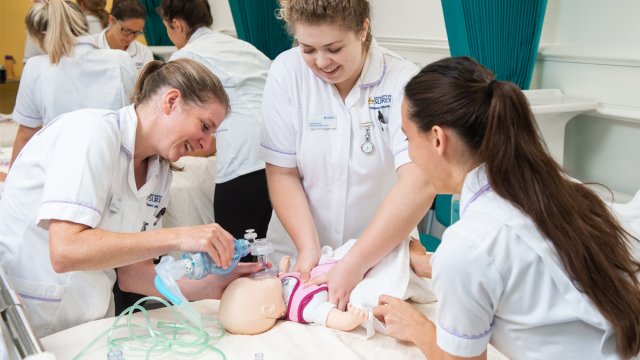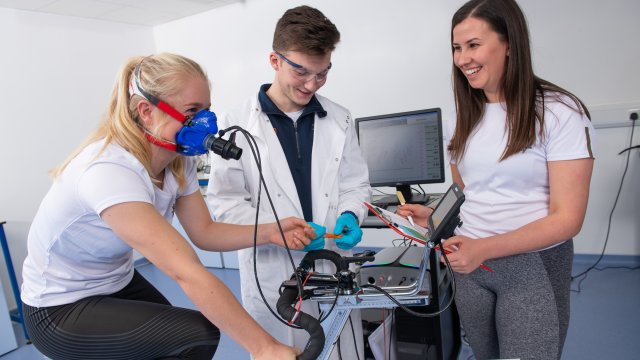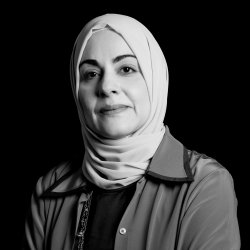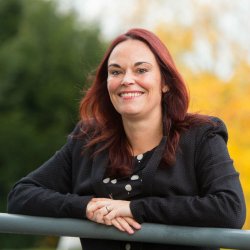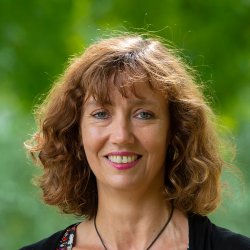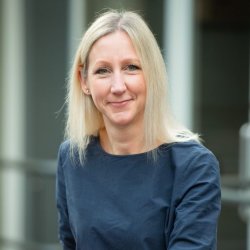Following in Daphne’s footsteps…
Surrey is home to an incredible range of female biology, health and psychology academics who have made their mark in research and industry. As part of our Year of Surrey Women in Science and Engineering – marking 50 years since Daphne Jackson became the UK’s first female Professor of Physics at Surrey – we talk to just a few of them.
Surrey’s Daphne Jackson became the first female professor of physics in the UK in 1971. How does her story resonate with you?
Professor Jane Ogden (JO): Daphne was very outspoken at a time where her discipline was dominated by men in suits. She caused a shift towards more female professors and made it easier for women to be heard and taken seriously.
Dr Hana Hassanin (HH): Daphne set up a programme to help women return from breaks in their career, something I’m passionate about. I’ve been helping and encouraging a lot of friends and colleagues to return to work, and become stronger and more successful than before.
Dr Katriina Whitaker (KW): I admire her passion for research, educating new generations and trailblazing women’s rights. I wouldn’t be in the job I am today if I hadn’t been supported to work flexibly throughout my career.
Dr Suzie Hingley-Wilson (SHW): She was an inspiration and her pioneering research into applications such as tomography has saved so many lives and answered so many questions. And she still found time to campaign for women’s rights and STEM.
Who have been the influential women in your academic journey?
JO: The women in my family have been influential to me. Both my grans worked and my mum went to university when I was seven. My sister blazed a trail to uni before me, and my female friends showed me how to manage a career and children.
HH: My mum’s always been an influential and very supportive woman since I was very young. Her dedication, patience and guidance have helped shaped me into who I am today.
KW: Professor Jane Wardle was my first mentor. She, like Daphne, died too soon of the disease she was trying to prevent. Jane was formidable and a leader in behavioural science. She made major contributions to cancer screening, early diagnosis and survivorship to improve the experiences of patients and save lives from cancer. The breadth and depth of her work are not matched anywhere else in our discipline, and her legacy is so much more.
SHW: My PhD supervisor, Dr Claire Spreadbury, was – and still is – a great influence. Her logical approach to complex questions and methodology was impressive, as was her continuous support and mentorship. She’d always find time to help – and she managed all of this and a successful research career while looking after twin boys.
What first got you interested in your field?
JO: I’ve always been curious about the world, from taking apart watches as a child, to building a go-cart from roller skates. As I grew up, this turned into curiosity about people and what made them tick. This inevitably led me to psychology.
HH: Since graduation as a physician, I was keen to be one of those who try to find solutions, treatments and prevention of diseases, rather than just prescribe available medicines. This was a strong drive to get involved, then be fully dedicated to conduct clinical trials in different therapeutic areas.
KW: I spent my PhD working at the Royal Marsden alongside cancer patients to understand more about their experiences. I loved working with patients and became passionate about helping prevent cancer or diagnose cancer earlier to realise the ambition of Cancer Research UK of ‘beating cancer sooner’.
SHW: My parents got me a microscope when I was little. I couldn’t believe the detail you could see in butterfly wings, onion skin and, my favourite at the time, pond water. I remember during my PhD looking at a human immune cell I had infected with Mycobacterium tuberculosis, the causative agent of Tuberculosis (TB), under an electron microscope. How could such a small bacterium survive and hijack this cell, capable of killing most other invading pathogens? We’re still finding out how and why.
What’s your area of research?
JO: I’m a health psychologist and most of my work focuses on eating behaviour and weight management, how symptoms are perceptions, and the impact of language on how we make sense of the world. The common thread across everything I do is the power of sense-making and how even apparently biological factors such as hunger, fullness or pain are very much influenced by how we think about them.
HH: My special interest and expertise are in oncology and immunotherapy. As a principal investigator, I conduct phase I-IV clinical trials in a wide spectrum of therapeutic areas.
KW: My expertise is in using behavioural science approaches to improve earlier diagnosis of cancer. I study how people make decisions about their symptoms, how and why they seek medical help, and what happens once someone presents to their GP and beyond (e.g. referrals, follow-up).
SHW: Figuring out survival and persistence mechanisms in Mycobacterium tuberculosis. I’m also working on bacteria that don’t cause disease, for example, harnessing useful byproducts in bacterial living paints.
What do you consider to be your greatest achievement so far?
JO: The 40 PhDs I’ve supervised and the hundreds of students I’ve taught. I’m also proud I was able to work part-time while raising my children before they flew the nest.
HH: Seeing some of the concepts I worked on very early in my clinical research career – in the lab and pre-clinical phases – become a treatment approach for some cancers and diseases, and the positive impact these have had on patients’ lives.
KW: Securing a Cancer Research UK fellowship for my work to understand help-seeking for potential cancer symptoms. This was the catalyst for my career and it’s led to many other projects and collaborations to ensure people seek prompt help for potential cancer symptoms.
SHW: At Surrey, it would have to be identifying key mechanisms that bacteria use to survive in the presence of antibiotics, using live single-cell microscopy. On a personal note, I was on MasterChef for around five minutes of fame – don’t ever mention gloopy mash to me!
Is there a particular female scientist whose work inspires you?
JO: All female psychologists do – it’s a privilege to be part of a field composed mainly of women.
HH: Since I was a little child, I was fascinated by Marie Curie when my dad told me her story after I asked him how x-rays work.
KW: The first person that pops into my head is Annette Karmiloff-Smith. I first learnt of her work during my undergraduate degree and I felt inspired by her approach to understanding child development. She was bold, challenging, creative and an inspiration to future women scientists.
SHW: It would have to be Elizabeth Bugie Gregory. In 1944, she discovered one of the frontline TB drugs, streptomycin. Her name is on the publication, but not the patent or Nobel Prize. She was told it wasn’t important as one day “she’d get married and have a family.” She married, left to raise a family, then returned to graduate in library sciences, an area so different to her chosen career. This is such a frustrating – and probably not uncommon – story that women didn’t get the credit they deserved. I wish the Daphne Jackson Trust was around then!
Why should more women study STEM subjects?
JO: Women should be able to do whatever they want to do. They must be free to make choices, whether it be STEM or non-STEM subjects, paid work or raising children.
HH: Women have enormous skills and capabilities. We can handle many things at the same time and excel in all of them. We play a great and very diverse role in society from being mums, wives and working women. This diversity can be a great source of inspiration when working in STEM subjects and research.
KW: There is nothing that isn’t relevant to STEM! Although an academic career may not be for everyone, the skills that STEM subjects offer are diverse and transferrable.
SHW: I was the only girl in my A-level physics class. In an ideal world, this wouldn’t make a difference. But looking back, I felt very isolated. There are so many women out there that have so much to give. If we don’t promote STEM to women and girls, we could lose so many future Daphne Jacksons and Marie Curies.
Is there anything about the Surrey community that helped you succeed?
JO: I’ve found wonderful colleagues and great students who’ve made my working life fun and interesting. That’s about all you can ask for.
HH: The multicultural society, open-mindedness and diversity of the Surrey community have been a great help.
KW: I joined Surrey in 2014 and it’s one of the best decisions of my career. I’ve been supported and mentored to grow academically and be independent. I work flexibly to accommodate my family life and I have wonderful colleagues who inspire me every day.
SHW: The springboard and leadership courses I’ve taken at Surrey have helped me to realise that not knowing my goals and how to achieve them is like wanting to win the lottery, but not buying a ticket. It’s great to be part of a community where people aren’t afraid of speaking up.
What legacy do you hope you leave for the next generation of women scientists?
JO: That the most important part of work is the people you meet, how you treat them and whether you help them on their way. Whatever you achieve, in the end, you’ll be remembered for this.
HH: You can have a great family and still be successful in anything you want to do. Love what you do and be completely present with your heart, mind and soul when you do it.
KW: I hope my academic work and its legacy contributes to the body of knowledge on early diagnosis and improves patient outcomes. Personally, I hope I can continue to support other women scientists at an earlier stage in their careers to fulfil their potential and get the same professional and personal satisfaction I have from mine so far.
SHW: Little things can mean a lot as I have found during my career and childcare. I try to help my students in any way I can, and I mentor as part of a Medical Research Council network. I hope my daughter will know that we’re all equal and that science is great!






